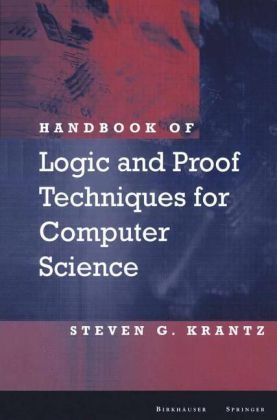Ulteriori informazioni
Logic plays a central conceptual role in modern mathematics. However, mathematical logic has grown into one of the most recondite areas of mathematics. As a result, most of modern logic is inaccessible to all but the specialist. This new book is a resource that provides a quick introduction and review of the key topics in logic for the computer scientist, engineer, or mathematician.
Handbook of Logic and Proof Techniques for Computer Science presents the elements of modern logic, including many current topics, to the reader having only basic mathematical literacy. Computer scientists will find specific examples and important ideas such as axiomatics, recursion theory, decidability, independence, completeness, consistency, model theory, and P/NP completeness. The book contains definitions, examples and discussion of all of the key ideas in basic logic, but also makes a special effort to cut through the mathematical formalism, difficult notation, and esoteric terminology that is typical of modern mathematical logic. T
This handbook delivers cogent and self-contained introductions to critical advanced topics, including:
Godel`s completeness and incompleteness theorems
Methods of proof, cardinal and ordinal numbers, the continuum hypothesis, the axiom of choice, model theory, and number systems and their construction
Extensive treatment of complexity theory and programming applications
Applications to algorithms in Boolean algebra
Discussion of set theory and applications of logic
The book is an excellent resource for the working mathematical scientist. The graduate student or professional in computer science and engineering or the systems scientist who needs to have a quick sketch of a key idea from logic will find it here in this self-contained, accessible, and easy-to-use reference.
Sommario
Preface
Notation and First-Order Logic
Semantics and Syntax
Axiomatics and Formalism in Mathematics
The Axioms of Set Theory
Elementary Set Theory
Recursive Functions
The Number Systems
Methods of Mathematical Proof
The Axiom of Choice
Proof Theory
Category Theory
Complexity Theory
Boolean Algebra
The Word Problem
List of Notation and Logic
Glossary Terms from Mathematical and Sentential Logic
A Guide to the Literature
Bibliography
Index
Info autore
Steven Krantz, Ph.D., is Chairman of the Mathematics Department at Washington University in St. Louis. An award-winning teacher and author, Dr. Krantz has written more than 45 books on mathematics, including Calculus Demystified, another popular title in this series. He lives in St. Louis, Missouri.
Riassunto
Logic is, and should be, the core subject area of modern mathemat ics. The blueprint for twentieth century mathematical thought, thanks to Hilbert and Bourbaki, is the axiomatic development of the subject. As a result, logic plays a central conceptual role. At the same time, mathematical logic has grown into one of the most recondite areas of mathematics. Most of modern logic is inaccessible to all but the special ist. Yet there is a need for many mathematical scientists-not just those engaged in mathematical research-to become conversant with the key ideas of logic. The Handbook of Mathematical Logic, edited by Jon Bar wise, is in point of fact a handbook written by logicians for other mathe maticians. It was, at the time of its writing, encyclopedic, authoritative, and up-to-the-moment. But it was, and remains, a comprehensive and authoritative book for the cognoscenti. The encyclopedic Handbook of Logic in Computer Science by Abramsky, Gabbay, and Maibaum is a wonderful resource for the professional. But it is overwhelming for the casual user. There is need for a book that introduces important logic terminology and concepts to the working mathematical scientist who has only a passing acquaintance with logic. Thus the present work has a different target audience. The intent of this handbook is to present the elements of modern logic, including many current topics, to the reader having only basic mathe matical literacy.
Testo aggiuntivo
"This is really what it promises to be—a good handbook: supple, self-contained, providing the necessary and sufficient working resources . . . it is more than [one] expect[s]: the rigor of usefulness and conciseness exceeds or equals . . . the pleasure of reading it."
—Zentralblatt Math
Relazione
"This is really what it promises to be a good handbook: supple, self-contained, providing the necessary and sufficient working resources ... it is more than (one) expect(s): the rigor of usefulness and conciseness exceeds or equals ... the pleasure of reading it." (Zentralblatt Math)

